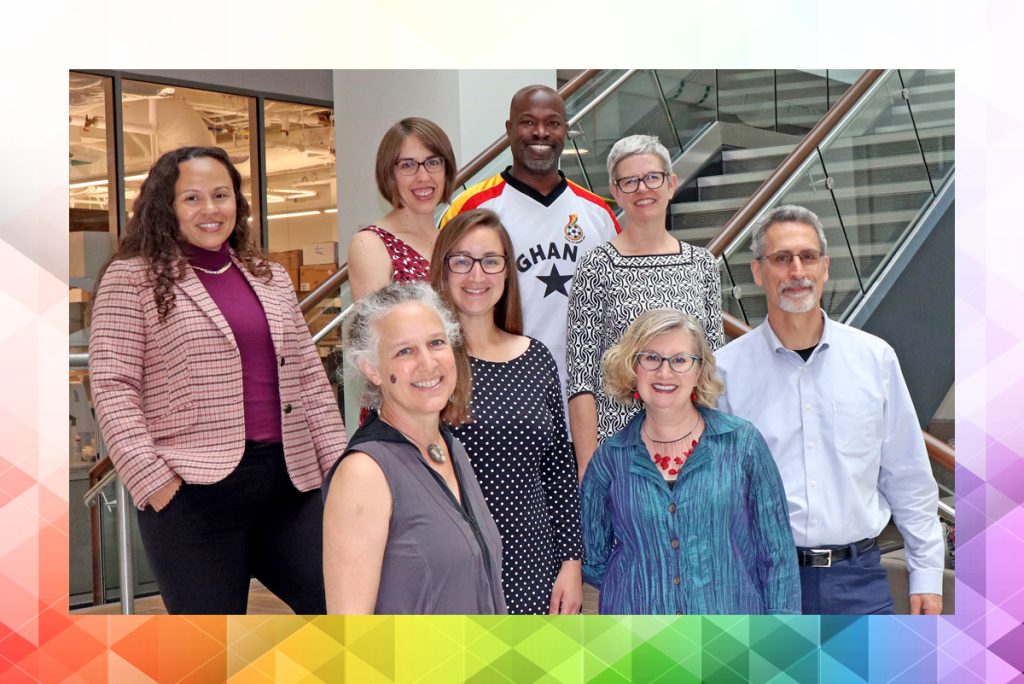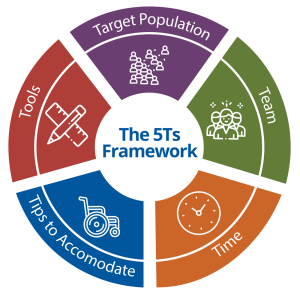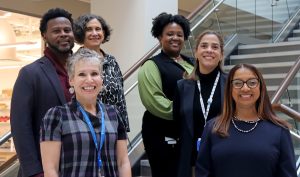CTSI Translational Impact 2022:
Advancing Equity

Table of Contents
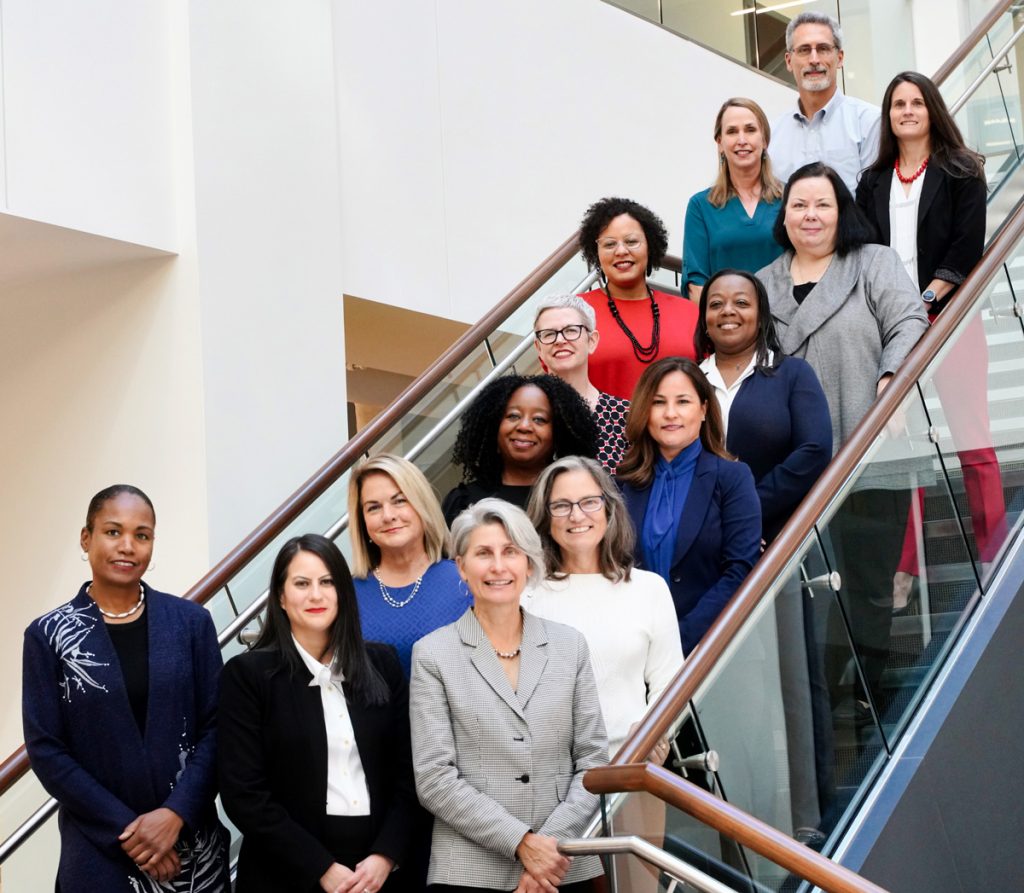
CTSI Director Ebony Boulware, MD, and the CTSI Executive Leadership Team
Message from the Director
 Throughout a global pandemic that has brought unprecedented challenges and altered our workflows and lives in dramatic ways, the Duke CTSI continues to advance clinical research and translational science that enables equity and makes health improvement more accessible for all. Following our dynamic and fast-paced reaction to the spread of COVID-19, the Duke CTSI funded or otherwise supported numerous studies that draw upon the breadth and scope of research at Duke and its partners and collaborators.
Throughout a global pandemic that has brought unprecedented challenges and altered our workflows and lives in dramatic ways, the Duke CTSI continues to advance clinical research and translational science that enables equity and makes health improvement more accessible for all. Following our dynamic and fast-paced reaction to the spread of COVID-19, the Duke CTSI funded or otherwise supported numerous studies that draw upon the breadth and scope of research at Duke and its partners and collaborators.
Our programs and centers support each step along the translational spectrum: from preclinical discovery and entrepreneurship; through clinical trials to assess efficacy; to implementation into widespread practice that improves public health. As one of 61 NIH National Center for Advancing Translational Science (NCATS) Clinical and Translational Science Award-funded hubs – with strong and generous institutional support from the Duke University Health System – we continue to strengthen resources and expand opportunities for our CTSI members.
This Impact Report showcases many of our accomplishments over the past year. I invite you to review these highlights and learn more about Duke CTSI’s contributions to meaningful and equitable health improvement within our communities and beyond.
Sincerely,
Ebony Boulware, MD, MPH (she/her/hers)
Nanaline Duke Distinguished Professor in the School of Medicine
Chief, Division of General Internal Medicine in the Department of Medicine
Director, Clinical and Translational Science Institute
Associate Vice Chancellor for Translational Research
Vice Dean for Translational Science
Duke University School of Medicine
Centering Equity, Diversity, and Inclusion
From the beginning, CTSI has worked to change the paradigm in translational research by actively supporting scholarship, career development, and funding opportunities for underrepresented ethnic group (UREG) investigators. The CTSI makes the same commitment to diversity and inclusion internally, and continually works to center equity within our institutional culture.
This year, that commitment has resulted in new scholar programs and ongoing community outreach with partners at North Carolina Central University (NCCU), Durham Technical Community College, and other schools to provide more scholars with access to Duke’s outstanding clinical research expertise and resources.
We strive to support the advancement of the next generation of interdisciplinary research leaders, including the development of innovative educational, training, and internship opportunities to build a diverse, inclusive, and skilled workforce. The CTSI maintains an intentional focus on inclusion and representation in clinical research and data science at Duke.

Faye Calhoun, PhD, Special Assistant to the Chancellor, North Carolina Central University (NCCU); Eugene Washington, MD, Chancellor, Duke University Health System; Johnson Akinleye, PhD, Chancellor, NCCU; Mary Klotman, MD, Dean, Duke University School of Medicine; Carlton Wilson, Dean, College of Arts, Social Sciences, and Humanities, NCCU; Ebony Boulware, MD, Director, Duke Clinical and Translational Science Institute
Duke CTSI and NCCU Celebrate Five Years of Innovative Partnership
In September 2022, Duke University and North Carolina Central University (NCCU), a historically black college and university, celebrated a five-year partnership marked by extraordinary gains in cross-institutional educational opportunities, impactful research initiatives, and strong community outreach and support.
Formalized in 2017 during a celebration event on NCCU’s campus, the partnership, with a $1.9 million investment from Duke, encourages joint clinical research projects and provides training and certification to NCCU students in conducting clinical research.
Though both universities previously collaborated on various initiatives, Ebony Boulware, MD, MPH, Director of the Duke Clinical and Translational Science Institute (CTSI), and NCCU Special Assistant to the Chancellor, Faye Calhoun, MS, DPA, spearheaded the strategic partnership to develop educational and career opportunities, fund and administer pilot projects, and strengthen engagement within the local community.
NCCU Chancellor Johnson Akinleye and Duke Chancellor for Health Affairs Chancellor Eugene Washington endorsed the deal initially negotiated between the directors of NCCU’s Biomanufacturing Research Institute and Technology Enterprise (BRITE) and Duke’s CTSI.
In 2021, Duke CTSI and NCCU established the Duke-NCCU Bridge Office, which creates a “bridge” for opportunities to collaborate, ensure workforce diversity, build new research teams, support underrepresented minority researchers, and improve health outcomes.
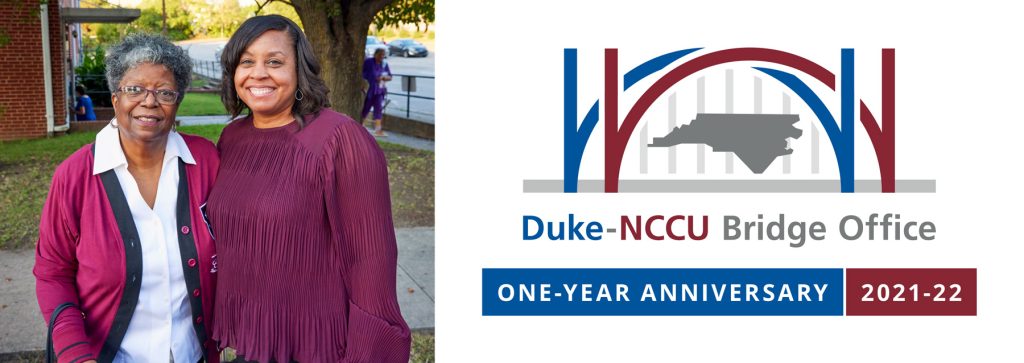
Faye Calhoun, PhD, NCCU Lead, Duke-NCCU Bridge Office; Lisa Davis, PhD, Director of Operations, Duke-NCCU Bridge Office
Boulware and Calhoun were instrumental in the office’s creation, which celebrated its one-year anniversary in 2022.
“I think the Bridge Office went from a good idea to a tremendous success in one year,” Calhoun said.
“We have grown together, and the partnership has strengthened over the years. Along with the Bridge Office, we have been working individually with investigators and students, which has led to achieving great results in clinical research for each university.”
Calhoun, who serves as the NCCU lead at the Bridge Office, said she is very proud of the work accomplished by the office in 2022 to bring the first summer cohort of 10 interns to Duke to partake in hands-on experiences in departments, clinics, and labs. In addition to working with mentors and research participants, the interns attended professional development workshops throughout the summer, gaining rich educational opportunities and building a strong network of potential future collaborators.
The Bridge Office’s leadership team also includes Faculty Director Gayathri Devi, MS, PhD, and Director of Operations Lisa Davis, MSPH, PhD. Devi and Davis bring diverse and complementary expertise and longstanding ties with both institutions.
Devi, an Associate Professor of Surgery and Pathology at Duke University, is also the Program Director of the Duke Inflammatory Breast Cancer Consortium and Associate Director for Research Education in the Department of Surgery. Davis is the Director of Special Projects at CTSI, Secretariat for the Lancet Commission on Hearing Loss, and lead for the Duke CTSI Training and Wellness Academies. In 2022, Sabrina Vereen, DHA, FACHE, LSSBB, also joined the office’s team on the NCCU side as the Research Program Leader.
Since 2019, the Duke-NCCU pilot awards have been awarded to a Duke and NCCU faculty member who work together to conduct a clinical study.
The latest study analyzed Alzheimer’s diagnosis and progression with Shih-Hsiu Wang, Department of Neurology at Duke, and Bin Xu, Biomanufacturing Research Institute and Technology Enterprise (BRITE) at NCCU. In addition, from 2019 to 2020, Ann Brewster with the Social Science Research Institute at Duke and Lorraine Taylor with the Criminal Justice, Juvenile Justice Institute at NCCU studied the mental health and well-being of rural African American transition-age youth (AA-TAY).
Duke CTSI’s workforce development pillar, led by Faculty Director Steven C. Grambow, PhD, and Senior Staff Director Amanda McMillan, MPH, MA, has been crucial in managing, coordinating, and training students, staff, and faculty throughout the partnership. In addition, the pillar also supports NCCU’s Clinical Research Science Program (CRSP), which offers a bachelor’s, certificate, and minor in clinical research at NCCU.
In 2023, the Bridge Office plans to continue building relationships in departments, strengthening the pilot studies program, becoming involved in new projects, and raising awareness for rare cancer research. It will continue supporting NCCU’s ethnodrama program – a form of theater turning research data into dialogue that resembles a traditional play – as an effective outreach platform to build social and health awareness within the community. The workforce development team will continue to assist with program and interprofessional education activities that involve multidisciplinary teams at Duke and NCCU.
Building on fantastic results from the past five years, the partnership continues to grow and produce diverse, engaging, and expansive clinical research opportunities for future scholars, staff, and faculty at both universities. The partnership will remain a vital asset for Duke, NCCU, and the Durham community for years to come.
Creating Essential Infrastructure to Advance Workforce Development
The Center for Pathway Programs (CPP) is cultivating a new model for collaboration across pathway programs in our academic ecosystem to increase impact for both programs and participants. Innovative tools and resources will help ensure that pathway programs can recruit and nurture trainees at all stages of their professional development, while easing the programmatic administrative burden so more time and effort can be spent producing high-quality content and results.
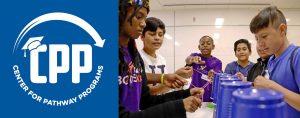
As part of a CPP offering, these students are members of the Duke BOOST program, designed to excite young people about science.
CPP tools and resources include:
- Web platform linking CPP participants with programs at Duke
- Living Learning Labs
- Strategic consults in program design
Underscoring the novelty of this approach, the CPP team was invited to present at the First Annual Pathway Programs and Bridges Conference to share its process for establishing a center, as well as host a roundtable discussion on the need for program connectedness at academic institutions across the country.

Kafui Dzirasa, MD, PhD
Workforce Development Core Co-Director Kafui Dzirasa, MD, PhD, is blazing an integrated Duke-NCCU neuroscience training and mentoring pathway by expanding his NIH-funded translational research laboratory to NCCU.
Given the pressing need to enhance health equity by removing obstacles hindering access to research careers for underrepresented groups, radical new approaches are required to break through the “red tape” of academic bureaucracy, creating and testing new models for increased impact. Dr. Dzirasa’s lab expansion showcases the possibilities for new modes of outreach and training when institutional barriers are questioned, re-examined, and dismantled.
Further expanding the pathway between Duke and NCCU, our Clinical Research Internship Portal (CRISP) placed 10 NCCU students in internships within the Duke clinical research environment in summer 2022. This effort, aided by the Duke-NCCU Bridge Office, helped to create a more formal path between the two campuses that will facilitate future experiential placements and increase student exposure to numerous career opportunities within the research workforce.

CTSA Integrating Special Populations Core
Closing Gaps in Research for Underrepresented Populations
Duke CTSA’s Integrating Special Populations (ISP) Core has introduced a variety of tools that support the inclusion of special populations in clinical research studies. The ISP Core facilitates research that promotes health equity for populations that have traditionally been under-represented in health research or excluded altogether, including infants and children, adolescents, and people with disabilities and/or rare disorders.
The ISP Snapshot is a web-based dashboard that provides a summary of the inclusion of special populations enrolled in Duke clinical research studies. This data presents information from studies as entered into the Duke clinical research management system (OnCore) with any accrual status. The ISP Snapshot informs both researchers and community stakeholders of the gaps in inclusion of special populations in Duke clinical research studies.
In partnership with the Duke Aging Center/Pepper Center, the ISP team and Dr. Barrett Bowling have developed a prototype website to translate the 5Ts Framework for Inclusion of Older Adults in Research into a resource tool for research staff and investigators.
The 5Ts website is an interactive search tool for research teams to learn about how the framework can shape the way researchers think about including older adults, and provide teams with a resource to find recommendations for designing or modifying research recruitment and engagement plans to facilitate engagement of older adults.
The ISP and the Children’s Health & Discovery Initiative (CHDI), led by Jillian Hurst and funded through a Translating Duke Health (TDH) award, collaborated to create the CHDI-CTSI Child Health Equity Program to support investigators at Duke and within the larger Durham community and surrounding areas who are conducting research to advance child health equity.
This program is designed to support research aimed at promoting health equity in the pediatric population, encourage and facilitate genuine partnership and collaboration with organizations within the larger Durham community and surrounding areas, and develop new interventions and strategies to mitigate health disparities and improve child health equity.
Finally, the ISP Core has hosted the ISP Research Symposium and Seminar Series for scholars, trainees, and/or early-career investigators focused on including special populations in research across the lifespan. The goal is to help this target audience develop skills and knowledge in conducting research among different special population groups and to extend training in life course and disparities research. Additionally, the ISP team provides professional development opportunities to support researchers’ engagement with special populations in clinical and translational studies.
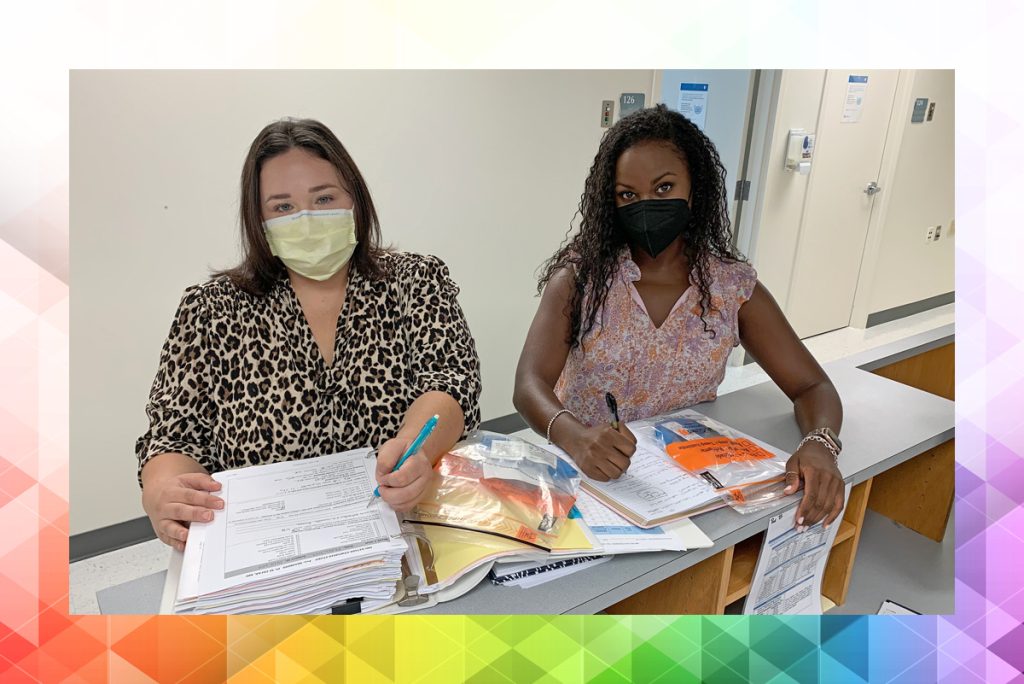
Duke CTSI partnered with Durham Technical Community College to support two Health Equity Scholars through a summer internship at Duke to learn more about clinical research.
Promoting Equity in Workforce Development
Underscoring Duke’s commitment to promoting equity in health care and health outcomes, the Duke-Durham Technical Clinical Research Equity Scholars Program debuted in 2022. This program is a partnership between CTSI and Durham Technical Community College to address a critical need to increase diversity in clinical research. The two-semester experience trains students on key strategies to engage with marginalized populations and incorporate equitable practices into the research process.
This collaborative initiative offered two Durham Tech students the opportunity to learn about equity in clinical research. These scholars worked with Duke researchers and staff on a kidney disease study, gaining hands-on experience with study protocols, sample collection kits, and engaging the local community. Among additional opportunities, they completed the Duke Office of Clinical Research’s Engagement, Recruitment, and Retention Certificate Program, which builds advocacy skills for inclusive research engagement practices.
Our inaugural cohort completed their training in July and are now applying those equity practices in their current work environments in follow-on internships within industry at Syneos Health — a multinational contract research organization based in Morrisville, N.C. specializing in late-stage clinical trials for companies. From networking, learning, and growing at Duke CTSI, each scholar advancing their clinical science careers and increasing awareness of clinical research and opportunities for participation.
Plans for the 2023 cohort include expanding the program in size and more fully integrating the didactics with the Engagement, Retention, and Recruitment certificate program.
Learn more about the inaugural cohort’s work in the Clinical Research Equity Scholars Program.
My time as a Clinical Research Equity Scholar at Duke CTSI taught me that there are countless clinical research professionals who are actively seeking to change the landscape regarding minority participation in clinical trials. The Equity Scholars program has significantly changed my views on the potential for achieving equitable health outcomes within my lifetime.
— Carmine Johnson, 2022 Inaugural Clinical Research Equity Scholar
Duke CTSI has allowed me to set myself apart in the clinical research field with knowledge that will be relevant, especially with the new regulations coming out. With the professional development courses and the Engagement, Recruitment, and Retention certificate that Duke has provided, I feel very confident and capable of succeeding in my future career.
— Michaella Collins, 2022 Inaugural Clinical Research Equity Scholar

The largest clinical trial to study whether giving steroids during pediatric open-heart surgery could be beneficial was led by a former KL2 scholar.
Former KL2 Scholar Leads Largest Trial on Steroid Use in Infant Heart Surgery
Kevin Hill, MD, who completed the Duke CTSA KL2 program, has published results from his clinical trial — the largest ever to examine whether giving steroids during a pediatric open-heart surgery could help post-operative recovery.
Dr. Hill credits the KL2 program with making valuable connections and strengthening his clinical trial design skills. As a KL2 scholar, his research also focused on pediatric heart disease, specifically radiation safety for children with the condition. Jennifer Li, MD, his mentor in the program, was a co-author on Dr. Hill’s trial publication in November 2022.
The KL2 program provides training and research opportunities for junior investigators to equip them with the vital skills needed to be successful, independent investigators who make contributions across the research spectrum — from laboratory observations to health interventions — for individuals and communities.
“The KL2 support gave me time to build career foundations, and it gave me access to resources that I wouldn’t otherwise have had. That support has been invaluable.”
— Kevin Hill, MD, former Duke CTSA KL2 Scholar
NCSP Grad, Now Duke Clinician, Works for Health Equity as Change Agent

Rushina Cholera, MD, PhD
Part of the 2019-2021 inaugural cohort of Duke’s National Clinician Scholars Program (NCSP) and now a pediatrician and epidemiologist at Duke, Rushina Cholera, MD, PhD, not only excelled in rigorous, mentored training but also became part of the Duke family, continuing the Duke CTSI legacy of nurturing health equity change agents.
NCSP comprises six prestigious universities nationwide and provides physicians and post-doctoral nurses training in policy and health improvements. The two-year program aims to cultivate health equity, eliminate health disparities, invent new models of care, and achieve higher quality health care at a lower cost.
The Duke NCSP focuses on community-based research, health services research, health policy, and implementation science across various disciplines. Cholera was one of four scholars prepared for leadership in clinical research and health policy in North Carolina and beyond.
Cholera completed her MD and PhD in Epidemiology at the University of North Carolina at Chapel Hill before doing a pediatric residency there as well. While doing her residency, she saw the impacts of immigration policies on healthcare outcomes for Spanish-speaking families, which catalyzed her interest in learning more about health policy. After her residency, she decided to apply to Duke’s NCSP. Throughout the application and interview process with multiple NCSP programs nationwide, Cholera found that the program at Duke would best meet her career objectives.
“The program launched my career as a clinical scientist, particularly for someone like myself who is dedicated to policy-facing work that has the potential for real-world change,” Cholera said. “The program’s focus on community engagement and being embedded in the Duke Margolis Center for Health Policy allowed me to do the type of work I wanted, and those things attracted me to the program.”
Upon graduating from NCSP in 2021, Cholera transitioned directly to joint faculty appointments at Duke in Pediatrics, Population Health Sciences, and the Duke Margolis Center for Health Policy. In these appointments, she is an Assistant Professor of Pediatrics, an Assistant Professor in Population Health Sciences, and a Faculty Fellow at Duke-Margolis Center for Health Policy.
“It feels amazing,” she said. “Similar to when I started the NCSP fellowship, it was really clear that staying at Duke would be the right choice.”
Like her initial work in NCSP, Cholera’s work today involves understanding the unmet social and healthcare needs of children and families to promote health and health equity. She continues to study policies impacting the health and well-being of immigrant and refugee families. In her clinical work, she enjoys walking with families through every step of parenthood and beyond.
“The program allowed me to bring together and hone multiple different skills in research, policy, and clinical work to genuinely lead to impactful change,” she said. “I think that for those finishing their residency, this opportunity to be a change agent is a unique focus within NCSP that other fellowship programs don’t have. This approach leads to both an invaluable skillset and perspective for future students and scholars.”
During her time as a scholar, Cholera said some important milestones included working with policymakers with the North Carolina Department of Health and Human Services on the Early Childhood Action Plan. That plan was developed to improve early childhood outcomes statewide related to children’s health, safety, and well-being in the state by 2025. She also wrote a published commentary — aside from only focusing on research papers — that voiced inequities in health. These milestones as an NCSP scholar pushed her in the direction of being not only an academic scholar but also a leader.
Recently, two new NCSP scholars were announced for the 2023-2025 cohort and represent the fifth group of interdisciplinary researchers recruited to the Duke NCSP site. More information and how to apply to be a scholar can be found on CTSI’s Duke NCSP webpage and NCSP’s main website.
Catalyzing Discovery and Research to Accelerate Innovation
The CTSI remains committed to advancing scientific discovery that will improve human health and health equity by holistically supporting research, from early work in the lab to improved health practices for patients and communities.
Through pilot funding and improved access for Duke investigators to a robust biorepository, the CTSI helps reinforce and support ongoing clinical research at Duke. Participation in national studies and data marts also extends Duke’s research impact beyond the local community, and our expertise in informatics and data science drive pragmatic and informed decision-making in health care and translational science. This brings us closer to finding better care for patients and prepares us to support solutions for new issues such as algorithmic bias. The CTSI supports innovative work to ensure that cutting-edge data science also advances health equity, and we collaborate with Duke and other institutions nationwide to provide researchers with access to broader data resources.
By creating and supporting partnerships across and beyond the CTSI that advance our visionary goal of improving human health and health equity, we work to strategically build and strengthen capacity for clinical and translational science.
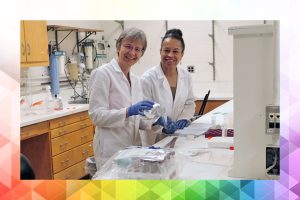
Friederike Jayes, DVM, PhD, Assistant Professor in Obstetrics and Gynecology at the Duke University School of Medicine, and Darlene Taylor, PhD, Professor of Chemistry and Biochemistry at NCCU, combined their research to advance a fundamentally new approach for treating uterine fibroids.
Engineering Smart Therapeutics: Innovative Treatment for Uterine Fibroids
A collaboration by researchers at Duke and North Carolina Central University (NCCU) aims to offer a more convenient, less invasive treatment for uterine fibroids, one of the most common—and under-studied—issues in women’s health.
Uterine fibroids—benign tumors made of stiff collagen tissue that grow on the uterus—are common reproductive-age tumors. Sometimes these growths are harmless and can even go undetected, but in many cases they cause symptoms ranging from pain and bleeding to infertility. More than 80% of Black women and nearly 70% of white women have fibroids by age 50. Current interventions are either expensive, difficult to access, or have significant systemic side effects.
After nearly a decade of working in parallel at campuses separated by just four miles, Friederike Jayes, DVM, PhD, Assistant Professor in Obstetrics and Gynecology at the Duke University School of Medicine, and Darlene Taylor, PhD, Professor of Chemistry and Biochemistry at NCCU, are now combining their research to advance a fundamentally new approach for treating uterine fibroids.
Jayes has long been fascinated with this problem and is involved in developing a new therapeutic treatment using a drug capable of breaking fibroids down inside the body. Since the tumors are collagen-based, the key ingredient in this intervention is collagenase, an enzyme that digests collagen. Meanwhile, Taylor has created a product called LiquoGel™, which serves as a platform to deliver drugs to targeted locations inside the body.
Having known one another since 2008, they had long imagined combining the two lines of inquiry to fill what Jayes calls “the unmet need” of uterine fibroids.
“It was wishful thinking,” Taylor says. Jayes adds, “We didn’t have the means to put them together.”
That changed in 2019, when they got their chance in the form of a pilot project grant from Duke CTSI designed specifically to facilitate Duke-NCCU collaboration. The grant provided both funding and project management support.
“That funding award allowed us to combine the drug with LiquoGel™ for the first time and do a study,” Taylor says. “The project management piece was phenomenal as well. I don’t know that we would be where we are right now without that kind of support.”
LiquoGel™, when combined with a collagenase drug inside of a syringe, can be delivered directly to a tumor. It changes from a liquid to a gel inside of the body.
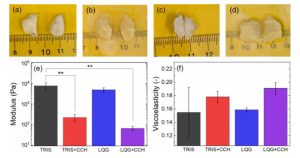
LiquidGel is injected into fibroids; over time, it partially degrades, allowing the body to get rid of it.
To understand how this combination works in practice, Taylor suggests imagining a bowl of gelatin with chunks of fruit suspended in it. In this analogy, LiquoGel™ is the gelatin, and the fruit is the fibroid-digesting drug. But there is one key difference: unlike a gelatin that someone would eat, which solidifies as it cools, LiquoGel™ firms up when it is warmed.
“The beauty of LiquoGel™,” Taylor explains, “is that it’s liquid at room temperature, and it becomes a gel at body temperature. Because of that, it gets delivered to the fibroid and becomes a gel. The co-dissolved drug is trapped during the gel process, and it’s much less likely that the drug will be washed out.”
In other words, the drug can be injected directly into the desired area and will stay there, doing its work without affecting other parts of the body. Over time, the LiquoGel™ partially degrades, allowing the body to get rid of it.
Jayes and Taylor feel that uterine fibroids, because they are almost never fatal and only affect women, have not received the scientific attention they deserve.
“In my eyes, it’s one of the typical ‘women’s diseases,’” says Jayes. “Women suffer, but it often gets minimized.”
Several other treatment options do exist, each with advantages and drawbacks. The ultimate resolution to uterine fibroids is a hysterectomy—major surgery to remove the uterus. While this solves the problem permanently, it also entails a lengthy recovery and means the patient could never again become pregnant.
“For some women, a hysterectomy is not desirable,” says Jayes. “It’s not a small thing. It is major surgery with risks.”
There are also less invasive surgeries to remove the fibroids, but this does not prevent regrowth and still involves pain and recovery. Certain medications can help, including birth control and other hormonal treatments, but these also have systemic effects on the body.
The combination of LiquoGel™ and the collagenase drug, by contrast, could be administered in a doctor’s office and would act only on the tumor itself.
While the Duke-NCCU award “stabilized the collaboration,” according to Jayes, much work remains before the treatment can reach patients.
The team has secured follow-on funding from North Carolina Biotechnology Center to conduct scale-up production of LiquoGel™ and time-course studies, as well as other essential research to facilitate the process of enabling clinical trials and ultimately seeking FDA authorization. At the same time, they intend to look at the social side of the uterine fibroid problem: what perceptions, beliefs, and cultural issues inform the care that women receive, and the care they want?
“We need to know if people would adopt the LiquoGel™ intervention,” says Jayes. “Where is this most needed, and what is the most desirable characteristic of it? We want our work to enrich the fibroid field.”
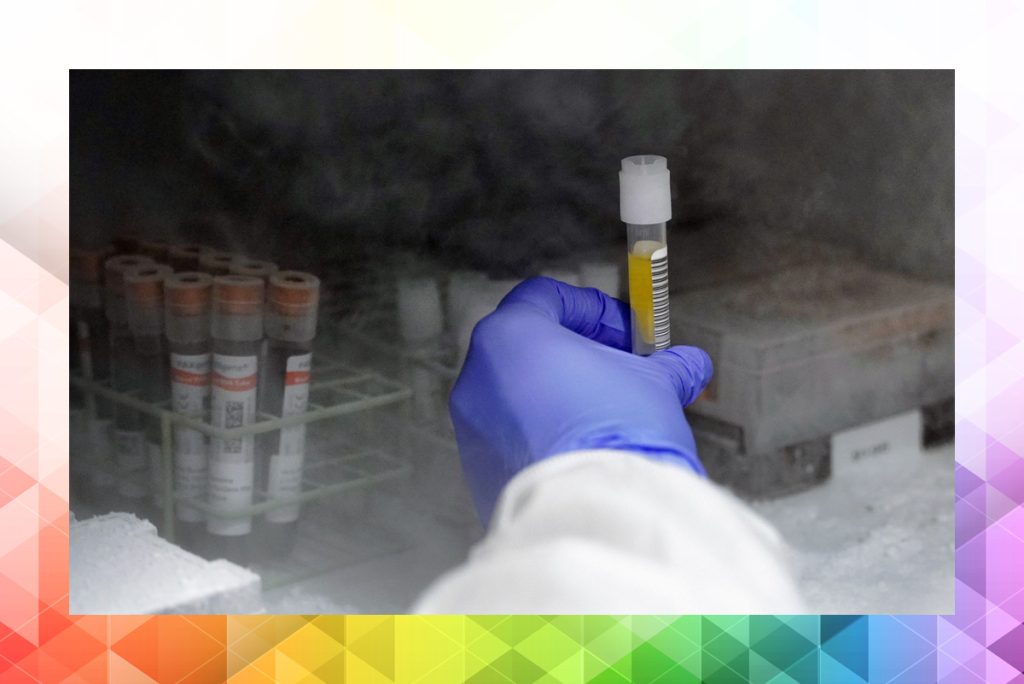
With a new initiative to improve access for Duke investigators to a robust biorepository, the CTSI reinforces and supports ongoing clinical research at Duke.
Duke Kannapolis Distributes Biospecimens to Investigators
Duke Kannapolis has launched the MURDOCK Biorepository Transformation Initiative to distribute biospecimens to Duke investigators for research, converting them into rich molecular datasets. The MURDOCK Study is a groundbreaking 12,526-participant community-based longitudinal cohort linked to clinical data and up to 14 years of outcomes data. The broad phenotypes in this representative cohort enable investigators to study many different diseases and longitudinal outcomes, in addition to serving as matched controls.
Learn more about the initiative.
“Through this science-forward initiative, we are making thousands of biospecimens and associated clinical and outcome data available to all Duke researchers. We are thrilled for the opportunity to share this powerful resource with more Duke collaborators, and we are incredibly grateful to the greater than 12,000 participants who contributed to one of the most unique biorepositories of its kind.”
— Svati Shah, MD, MHS, Director of Duke Kannapolis

Ongoing contributions from 1,000 Project Baseline Health Study participants enrolled by the CTSI continue to fuel research and discovery, including a recent finding regarding the risk of diabetes.
Changes in Participants with Prediabetes Predict Increased Risk
Project Baseline Health Study participants with prediabetes demonstrated changes in cardiac, pulmonary, and hematology measures, as well as declines in physical function and sleep, that precede diabetes. Some of these changes over four years of follow-up predicted an increased risk of progression to diabetes.
Changes to body measurements and physical function seemed to be the most important factor in predicting whether a participant would progress to diabetes or revert to normal blood sugar control.
The findings reflect the work of a multi-institutional research group led by Duke. The Project Baseline Health Study is a collaboration between Duke, Stanford University, Verily Life Sciences, and others.
Read the article and learn more about the Project Baseline Health Study

Easton Sinnamon smiles alongside his sister, Ivy, at his 1-year birthday celebration. Photo provided by the Sinnamon family.
Regulatory Affairs Office Contributes to Infant Heart Transplantation Milestone
With CTSI support, the Duke Office of Regulatory Affairs and Quality (ORAQ) played a key role when a baby received what is believed to be the world’s first combination heart transplant and allogeneic processed thymus tissue implantation. The two procedures, performed at Duke University Hospital under an expanded access application that was allowed to proceed by the FDA, represent a milestone in heart transplantation. ORAQ supported the FDA regulatory requirements and provided Quality Oversight for the Good Manufacturing Practice (GMP) of the product at the Duke MC3 Robertson GMP Facility.
Read the article about the procedure and watch the video.

Artwork by Hertz Nazaire (1973-2021), a Haitian-American artist whose work drew attention to the lived experience of Sickle Cell Disease.
Continued Funding Advances Sickle Cell Disease Research
Duke CTSA’s Integrating Special Populations (ISP) Core facilitates research that promotes health equity for populations that have traditionally been under-represented in health research or excluded altogether, including people with rare disorders. Following initial pilot funding, the ISP now provides bridge funds for a previous Duke CTSA Special Populations Pilot Award (PI: Mitch Knisely, PhD) to continue biospecimen collection and self-reported pain measures with about 120 participants in the NIH sickle cell disease (SCD) network registry.
With preliminary findings from this pilot award in March 2022, Dr. Knisely received NIH funding for a study, “Epigenetic Age Acceleration and Psychoneurological Symptoms in Sickle Cell Disease” to advance research in this area. The ISP funded this pilot award in year two to Dr. Knisely, with results published here and in a featured case study of the Translational Science Benefits Model. The inclusion of biospecimens in the NIH dbGAP repository will increase representation of people with SCD in this biobank database.
Embracing and Advancing Community Engagement in Research
The CTSI has developed and implemented a community-based approach to clinical research that centers study participants as valued partners. Our communities in Durham and Kannapolis have responded to this approach with ongoing dedication to clinical research studies that aim to improve health for generations to come.
As an institution, the CTSI works tirelessly to fully integrate equity at every level by applying an equity lens to existing services and infrastructure. By connecting academic stakeholders with community partners locally, regionally, and nationally, we facilitate an equitable and robust community-engaged health research landscape.
This commitment to equitable and community-engaged research provides investigators with a unique and remarkable experience when working with our teams on grants, projects, and initiatives. In partnership with both our academic collaborators and valued community members, the CTSI draws upon Duke’s rich history of discovery to explore and pursue opportunities for the next exciting phase of translational research.

Research Equity and Diversity Initiative (READI) seeks to improve the health of communities and advance health equity. The Research@Pickett clinic is the only Duke facility in Durham entirely dedicated to clinical research, with a diverse, bilingual staff.
Duke Receives $2.65M Grant to Increase Diversity and Equity, Opens New Clinical Research Center in Durham
Duke CTSI, Duke University School of Medicine, and Duke University Health System together launched a new initiative in 2021 aimed at achieving equitable representation in clinical research.
The Research Equity and Diversity Initiative (READI) seeks to improve the health of communities and advance health equity by making it easier for community members and researchers to collaborate on health research that is important and relevant to local communities.
READI is supported by a $2.65 million grant to the School of Medicine from The Duke Endowment. The funding supports community engagement programs and practices aimed at addressing barriers to research participation, increasing diversity in clinical research, building community trust, and reducing health disparities.
“Duke University School of Medicine has one of the largest clinical research portfolios in the country, with more than 1,200 clinical investigators,” says Susanna Naggie, MD, MHS, Associate Professor of Medicine, Vice Dean for Clinical Research, and incoming Interim Director of the CTSI. “It’s critical to ensure that clinical research results are broadly applicable for all members of our community. Yet nationwide, large, randomized trials heavily enroll non-Hispanic, white participants, even as other under-represented groups shoulder a heavier burden of disease.”
The community will play a central role in shaping and leading the work of this initiative. A key project is to develop a Community Based Research Network (CBRN), which will engage community-based clinics, primary care organizations, and Durham Regional and Duke Raleigh hospitals. The network will be used to solicit feedback on major barriers to achieving equitable health outcomes and facilitate increased diverse participation in clinical research.
READI’s community-based approach to health research relies on the guidance and advice of its Community Advisory Council, made up of study participants, healthcare providers, patients, and community and faith leaders. Through this essential collaboration, we are working together to ensure trustworthiness in research and increase broad representation in research participation and the research workforce.
“Community partners have been at the heart of this project’s development from the beginning,” says L. Ebony Boulware, MD, MPH, Director of the CTSI and Vice Dean for Translational Sciences. “We could not have secured this grant without our partners, and they will continue to drive its success going forward.”
Duke redoubled efforts to increase community participation in research studies in October 2020, when the School of Medicine opened a clinical research center in the Durham community to address the urgent need for COVID-19 clinical research space. This is the only Duke facility in Durham entirely dedicated to clinical research, with a diverse, bilingual staff. READI enables Duke to grow the clinical research portfolio across a breadth of clinical research needs, develop a strong community engagement and partnership culture, and become a self-sustaining research unit for years to come.
“Duke is committed to being an equitable and trustworthy partner in both the delivery of care and in research,” says Nadine J. Barrett, PhD, Assistant Professor Department of Community and Family Medicine; Associate Director of Equity, Community Engagement, and Stakeholder Strategy for the Duke Cancer Institute; and Director of the Center for Equity in Research at the CTSI.
“The perspectives, expertise, and partnerships with our community are critical to improving the health of those who are underserved in healthcare and underrepresented in research. We look forward to continuing our work together.”
— Nadine J. Barrett, PhD
READI has convened a Community Advisory Council to provide insights and guidance, as well as co-develop outreach efforts to reach diverse populations in the region. Partners such as NCCU, the Latinx Advocacy Team and Interdisciplinary Network for COVID-19 (LATIN-19), the African American COVID Taskforce Plus (AACT+), faith leadership networks, and others representing perspectives, experiences, and knowledge from across Durham and surrounding counties have been engaged in planning high-impact outreach activities.
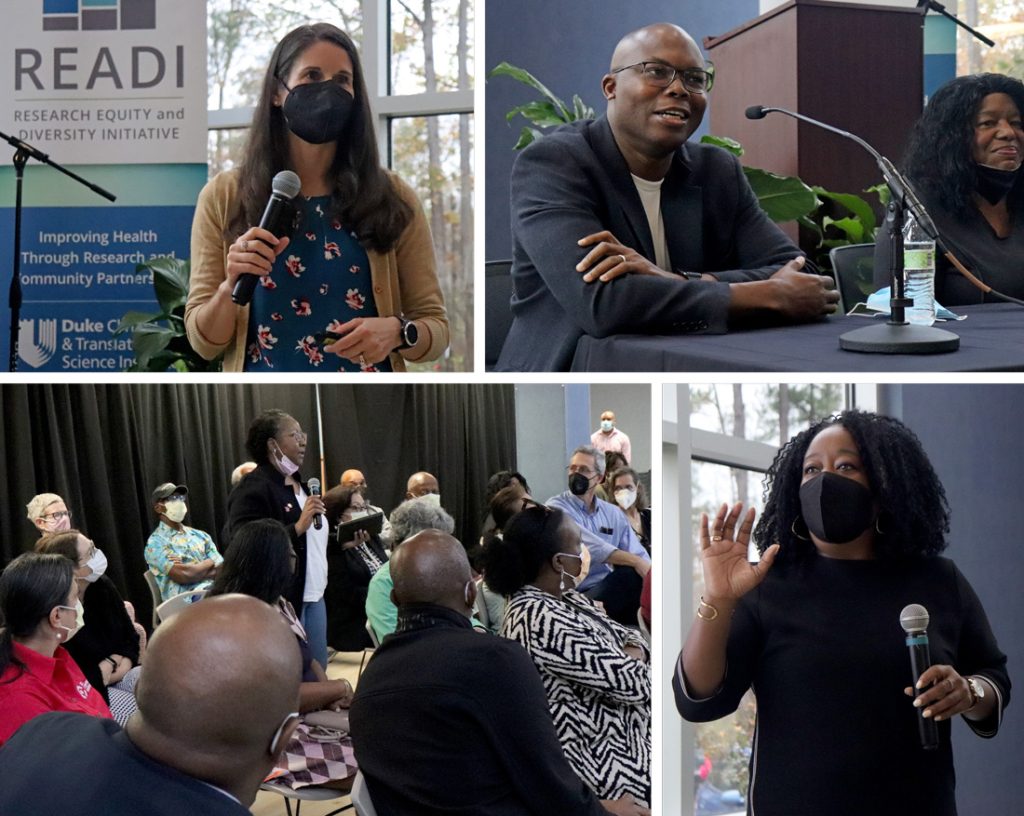
Members of the Durham community join Duke faculty and staff at READI’s first community event in the Research@Pickett clinic.
Funding from The Duke Endowment includes the Research@Pickett Community Outreach and Engagement Voucher Program, designed to build capacity for research projects to maximize their impact. The selected applications feature community-partnered research projects that focus on enhancing diversity of clinical research and improving community health.
“These awards are a tangible and pragmatic way to implement meaningful strategies for engaging community partners in projects to improve the health and wellbeing of our community members,” says Dr. Naggie.
Funding for the following studies began in July 2022 and will run through June 2024:
- Diet and Hypertension Management in Black Adults with Chronic Kidney Disease
Crystal Tyson MD, MHS, Assistant Professor, Division of Nephrology
- Addressing the Racial Health Disparity in Keratoconus: Improving Keratoconus Screening and Identifying the Barriers to Follow-Up in Black Patients
Lloyd Williams, MD, PhD, Associate Professor of Ophthalmology
- CARE and Justice: Community Partnerships and Engagement to Advance Racial Equity in Kidney Disease and Research
Opeyemi Olabisi, MD, PhD, Assistant Professor of Medicine, Division of Nephrology
As part of this award, study teams are leveraging Duke Research@Pickett services and staff to increase diverse participation in clinical research, enhance community-partnered research, and enable community engagement and promote outreach activities.
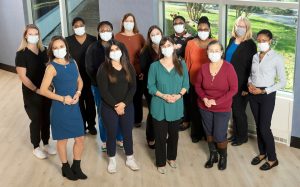
Clinical research staff at the Research@Pickett clinic
“We expect these awards will improve awareness, education, and participation in clinical research among underrepresented and underserved populations,” says Dr. Naggie. “Our hope is that these studies will provide actionable data to improve the health of our community.”
Learn more about READI. See photos from READI’s first community event.

Based in Charlotte and established in 1924 by industrialist and philanthropist James B. Duke, The Duke Endowment is a private foundation that strengthens communities in North Carolina and South Carolina by nurturing children, promoting health, educating minds, and enriching spirits. Since its founding, it has distributed more than $4 billion in grants. The Endowment shares a name with Duke University and Duke Energy, but all are separate organizations. For more information, go to https://dukeendowment.org/.

Durham community-based organizations leverage funding from Duke School of Medicine Dean Klotman to provide and distribute meals to communities members impacted by the COVID-19 and influenza pandemics.
Dean’s COVID-19 Initiative Provides Direct Services to Community Members
Amidst the ongoing influenza and COVID-19 pandemics, there remains a critical need to improve access to accurate, timely, and trustworthy information about vaccinations, treatment, and information on other chronic diseases to people from historically and currently marginalized communities.
Through generous support from Duke University School of Medicine Dean Mary Klotman and the Duke University Health System, Durham community organizations were able to extend and expand their efforts to mitigate the devastating impact of COVID-19 on the members of their communities. Lives have been saved, communities have been changed, and collaborative partnerships have been solidified.
The Community Engaged Research Initiative (CERI), part of Duke CTSI, provided essential resources to support this effort through the work of the community led and Duke-supported LATIN-19 group and the African American COVID-19 Taskforce (AACT+).
The goal of the Dean’s COVID-19 Community Grants Initiative is to provide $30,000 to amplify the efforts and expertise of existing community-based organizations (CBOs) to enable and extend their reach as they work to address COVID-19 health disparities in their communities. The funding for this work acknowledges that recommendations for improving access and trustworthy information must come from community members themselves and be based on their lived experiences.
With feedback and guidance from the community, this funding program will support identified needs, resources, education, and treatment around COVID-19 and associated chronic diseases, such as diabetes and hypertension among Black and Latinx/o populations in Durham.

The Dean’s Initiative leverages the efforts and expertise of existing community-based organizations (CBOs) to extend their reach as they work to address COVID-19 health disparities in their communities.
Throughout the planning process for this initiative, more than 600 community members and CBOs provided insights that shaped the priorities and dissemination process for this funding. In the first funding cycle, six CBOs received $5,000 each, from November 2021-April 2022:
- Community Health Coalition (CHC)
- Iglesia La Semilla UMC
- Partnership Effort for the Advancement of Children’s Health (PEACH) Durham, Inc.
- North Carolina Central University’s WNCU Radio Station
- North Carolina Central University’s Public Health Education Department
- Durham Together for Resilient Youth (TRY) Coalition, Inc.
This collaborative effort included CBOs, Durham City and County officials, Duke- and Durham-based researchers, clinicians, neighborhood leaders, and engaged residents who have banded together to implement COVID-19 mitigation efforts. Duke CTSI provided technical assistance to all CBO applicants and coordinated communications and reporting functions.
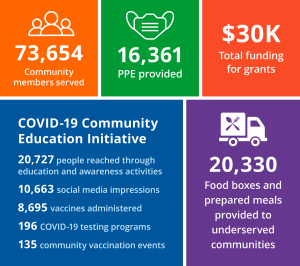 The first phase of the Dean’s COVID-19 Initiative demonstrated a variety of innovative solutions that can be replicated by other groups to address health equity and social health needs in the communities they serve.
The first phase of the Dean’s COVID-19 Initiative demonstrated a variety of innovative solutions that can be replicated by other groups to address health equity and social health needs in the communities they serve.
Resources were extended to a wide demographic of African American, Latino/x, and white community members within urban and rural communities in the region (Durham, Vance, Granville, Person Counties), and spanned generations from the elderly and young adults to children.
Services included education and awareness programs, community canvassing, interpretation, vaccinations, testing, PPE, food boxes, and prepared meal distribution.
As a result of $30,000 in funding, more than 73,654 community members were served and supported during the six-month grant period.
Following this success, a new funding cycle was announced and launched in November 2022. The primary focus will continue to address vaccine and booster uptake in underserved populations. A secondary focus will address other chronic diseases, such as diabetes and hypertension, which are closely linked to COVID-19.

The NCCU ethnodrama “Kites,” presented in October 2022, highlighted the opioid crisis and the lived experiences of those affected.
NCCU Ethnodramas Address Health Disparities in Durham Community
For the past four years, Duke CTSI and North Carolina Central University (NCCU) have been utilizing ethnodrama productions that use drama to address health equity and health disparities. With support from the CTSI, these plays are performed and produced by NCCU students, staff, and faculty and shed light on key issues for both institutions, as well as the Durham community. Jonathan Livingston, PhD, NCCU Professor of Psychology, is a principal investigator for the programs and oversees and coordinates the productions.
In 2020 and 2021, Duke CTSI and NCCU presented ethnodramas addressing diabetes (“A Touch of Sugga”) and COVID-19 (“The Right Right Now Show w/ Collin Aaron Bodi”). In 2022, the partnership highlighted the current opioid crisis (“Kites”) and the diverse lived experiences of those it has affected. The Duke-NCCU Bridge Office has avidly supported the productions, as has CERI’s AME Zion Health Equity Advocates & Liaisons (HEAL) partnership, which works with AME Zion clergy to increase and diversify clinical trials recruitment.
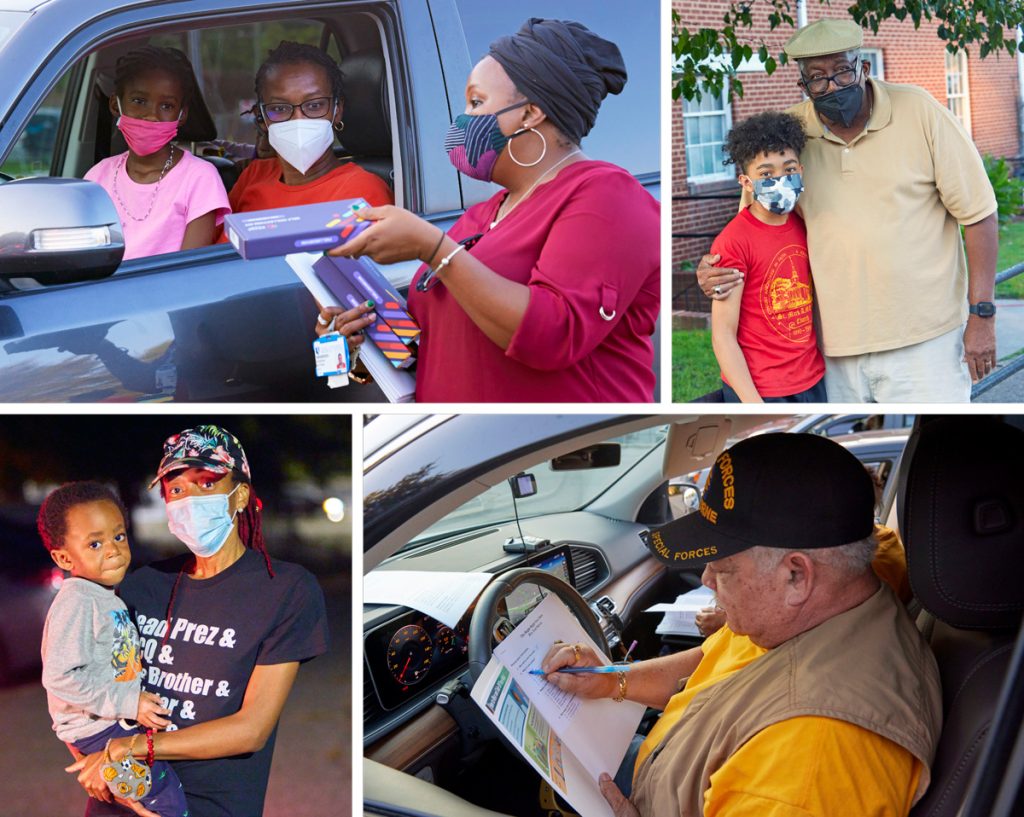
Focused on the COVID-19 pandemic, the 2021 ethnodrama, “The Right Right Now Show w/ Collin Aaron Bodi,” allowed community members to safely attend the drive-in show in their vehicles.

Community members watch the COVID-19 ethnodrama from their vehicles.
The ethnodrama team has been published in the Journal of Cervical Cancer Research for its impact in starting conversations about important health topics impacting communities. At the end of the presentations, guests are encouraged to complete surveys and ask questions. Additionally, each ethnodrama offers resources and ways to learn more about access to health services and screening and testing at local health centers.
Following the recent “Kites” production, Durham addiction and recovery organizations TROSA and TRY provided representatives for the panel discussion who described resources available in the community. Duke also had representatives from The Duke Addictions Program and the Duke Center for Adolescent and Young Adult Substance Use Treatment (CAST), which offers opioid addiction recovery.

The 2022 NCCU ethnodrama, “Kites,” focused on the opioid crisis.
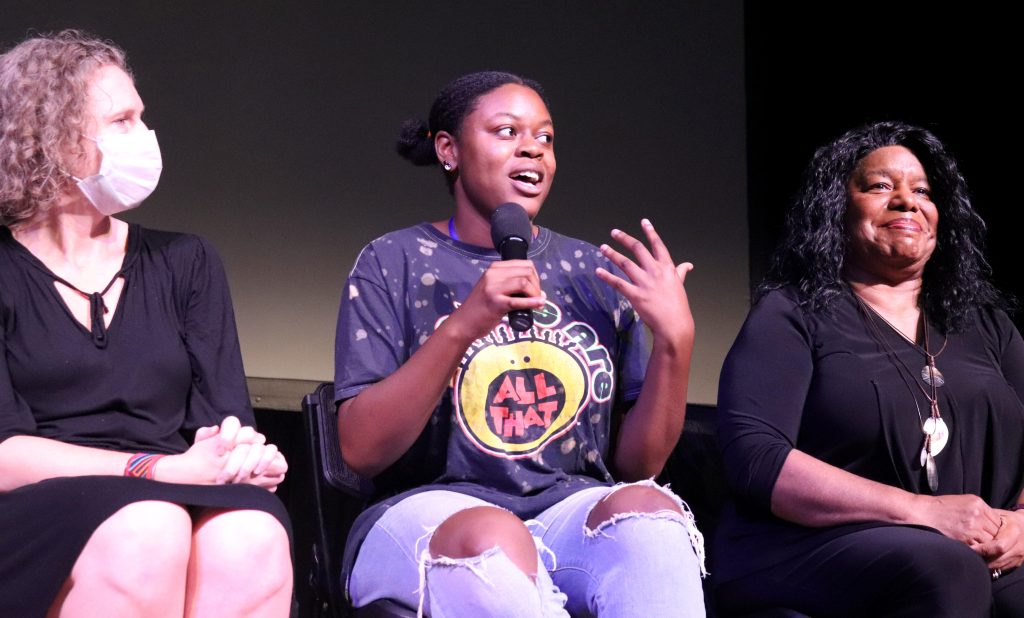
Representatives from numerous community organizations participated in a post-show panel to answer questions related to the opioid crisis and provide information about resources.
- Read CTSI coverage of diabetes, COVID-19, and opioid crisis ethnodrama productions.
Helpful Opioid Recovery Resources

Duke University President Price learned how community-engaged research at Duke Kannapolis accelerates science when he visited the North Carolina Research Campus for the first time with Svati Shah, MD, MHS, new Director of Duke Kannapolis.
Duke Kannapolis Exemplifies Impact of Community-Engaged Research
During his historic visit to Duke Kannapolis, Duke University President Vincent E. Price spoke about the importance of community-engaged research and scholarship, and Duke’s commitment to partnering with communities to advance clinical research and translational science. The CTSI research site in Kannapolis exemplifies Duke’s commitment to advancing community health and improving lives across the state.
“Through community-based research and partnerships, Duke Kannapolis is on the forefront of population health research,” said President Price, the first University president to visit the Duke Kannapolis facility on the North Carolina Research Campus.
During extensive roundtable discussions with community members, city and campus leaders, and Duke investigators, President Price heard firsthand how Duke Kannapolis’s expertise in community-engaged research accelerates science.
“Working collaboratively with participants is as important as working collaboratively with other scientists. We’re enlisting them, in a way, as their own scientists, because they want to understand as much about their health and their communities as we want to understand.”
— Duke University President Vincent Price, during his historic visit to Duke Kannapolis
Duke nephrologist Opeyemi Olabisi, MD described to President Price his difficulty in recruiting participants for a kidney health study in people with African ancestry, until he partnered with Duke Kannapolis.
“Because of how the Kannapolis system actually integrated with the community, within a very short time they were able to recruit over 180 people,” Dr. Olabisi said. “The level of engagement that I see from the community partners and participants tells me that people find value in the participation of research.”
At age 93, Pearl Asbury became the 100th person to join Dr. Olabisi’s study at Duke Kannapolis because she wanted to help solve a health mystery in people of African descent.
“I always wanted to be involved in a study just for Afro-Americans. It is wonderful because for so much of our history, our health has not been understood. At 93, it might not help me, but it might help my children, grandchildren and great-grandchildren.”
— Pearl Asbury, Duke APOL1 Study participant
Investigator Adam Goode, PT, DPT, PhD, said Duke Kannapolis delivered on his desire to create a cohort that reflected the community and included people from all walks of life for his musculoskeletal pain study, recruiting more than 100 participants in less than a year.
“Working with this group was truly motivating and productive,” Dr. Goode said. “It was much appreciated when compared to other experiences.”
Shantela Carter joined Goode’s study at Duke Kannapolis to help researchers understand how pain starts and progresses, and to help others who are in pain. Similarly, Susan Wagner and Rosa Dorantes joined the PROMOTE Study at Duke Kannapolis to help improve care for other people in their community with Type 2 diabetes.
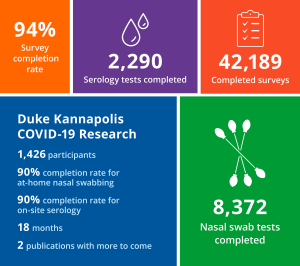 Thanks to a groundbreaking return of results initiative within the Project Baseline Health Study, Duke Kannapolis participant Laureen Kickham learned of a life-changing health condition. The study is a collaboration with the CTSI, Stanford Medicine, Verily Life Sciences, and others.
Thanks to a groundbreaking return of results initiative within the Project Baseline Health Study, Duke Kannapolis participant Laureen Kickham learned of a life-changing health condition. The study is a collaboration with the CTSI, Stanford Medicine, Verily Life Sciences, and others.
Two initial publications from the MURDOCK Cabarrus County COVID-19 Prevalence and Immunity (C3PI) Study also demonstrate the value of community-engaged research underway at Duke Kannapolis, including the study design and methods paper and an article about a pilot study with participants testing a medical device to collect their own blood sample.
Like many projects based at Duke Kannapolis, the C3PI project reflects deep collaboration both within Duke and with the community and external partners. The pandemic project features partnerships with the N.C. Department of Health and Human Services and U.S. Centers for Disease Control and Prevention, along with collaborators at UNC-Chapel Hill and Eastern Carolina University who conducted similar studies in Chatham and Pitt counties. Duke Kannapolis launched C3PI within months of the pandemic hitting North Carolina and enrolled 1,426 participants in three weeks, following them for 18 months to understand COVID prevalence and immunity in the community and how the pandemic affected participants and their families.

